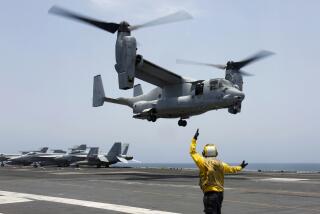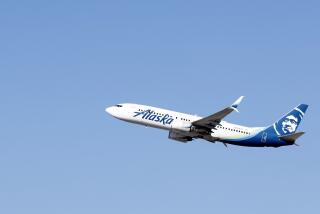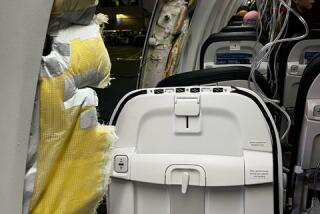Days after Asiana crash, FAA to require more training for co-pilots
Under a final rule to be put in effect next week by the Federal Aviation Administration, co-pilots who fly for U.S. passenger and cargo planes will face a more stringent certification process and a more extended training sequence.
Co-pilots, formally known as first officers, will be required to complete 1,500 hours of flight time. Previously, the requirement was 250 hours. First officers will also be required to earn an aircraft type rating, which involves additional testing and training specific to each plane they fly.
“We owe it to the traveling public to have only the most qualified and best trained pilots,” said Transportation Secretary Anthony Foxx in a prepared statement.
The FAA said the pilot qualification standards were spurred by the crash of Colgan Air Flight 3407 in 2009. Initially bound for Buffalo, N.Y., the plane stalled midair and crashed into a house. Fifty people were killed.
After the crash, families of the victims lobbied Congress to enact stronger regulations for regional carriers and apply more scrutiny to pilots’ operations and working conditions. The FAA’s announcement Wednesday is a formal step toward completing the stipulations laid out in the bill Congress passed in 2010.
The announcement comes four days after Asiana Airlines Flight 214 crash-landed at San Francisco International Airport, killing two people and wounding dozens more.
The pilot landing the plane, Lee Kang-kook, had just 35 hours of flying experience on the Boeing 777, and was being supervised by a captain who had been certified as a training pilot less than a month before the crash. It was Lee’s first landing in San Francisco in a Boeing 777 and co-pilot Lee Jung-min’s first landing at the airport in a training situation.
As written, the FAA’s new regulations would not apply to commercial pilots who are based in a foreign country. The difference in regulations surfaced Wednesday with Asiana Flight 214, when the National Transportation Safety Board revealed that the crew was not tested for drugs or alcohol after the crash because South Korea, where the airline is based, does not require it.
Later Wednesday, U.S. Sen. Charles Schumer (D-N.Y.) and U.S. Rep. Brian Higgins (D-N.Y.) will urge the FAA to introduce similar requirements at the September meeting of the United Nations’ civil aviation arm.
ALSO:
Long Beach moves closer to restricting ice cream truck music
Glendale approves Korean ‘comfort woman’ statue despite protest
San Francisco hospital working to reunite families after plane crash
Twitter: @laura_nelson
More to Read
Start your day right
Sign up for Essential California for news, features and recommendations from the L.A. Times and beyond in your inbox six days a week.
You may occasionally receive promotional content from the Los Angeles Times.







